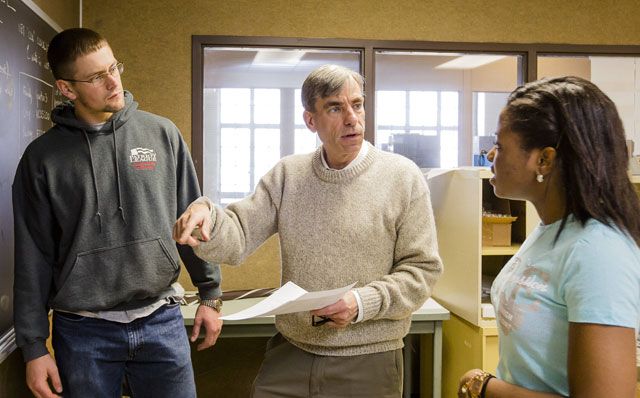
Electrical Engineering Professor and students pioneer improved radar methods
Recently-minted electrical engineering Ph.Ds Jiangfan Zhang '15 PhD and Anand Guruswamy '15 PhD are helping to reimagine the possibilities of radar communications through MIMO (multiple-input and multiple-output) communications. MIMO-based systems improve performance by using multiple antennas to transmit and receive radio signals. Yet, according to Professor Rick Blum, Jiangfan's and Anand's advisor, MIMO's principles have been applied only recently to radar, and have shown promise in overcoming shortcomings associated with traditional radar systems.
Zhang came to Lehigh in August of 2011 specifically to pursue a doctoral degree with Blum, Lehigh's Robert W. Wiseman Research Professor in Electrical Engineering. Zhang's dissertation investigated selected topics concerning sensor networks which focus on solving signal detection and estimation problems.
"When I was a master's student in China," says Zhang, "my research topic was about acoustic MIMO detection and estimation in waveguide, which is very close to some of Professor Blum's work, and hence I read many of his papers at that time. I believed that if I pursued my Ph.D. under his supervision, I could learn a lot from him and also do some very nice research."
Guruswamy's dissertation described work on improving the performance of MIMO radars while making them more practically viable, as well as techniques to better synchronize clocks over computer networks.
"Before coming to Lehigh, I was involved in research related to radar systems at my undergraduate university in India," he recalls. "By reading many academic papers, I had come to learn that Professor Blum was one of the foremost researchers in the world in a new type of radar called MIMO."
When Jiangfan and Anand successfully defended their dissertations in late 2015, they became the 19th and 20th Ph.D. students Blum has graduated over the course of nearly a quarter century with Lehigh.
Both of the new Ph.Ds describe parallel experiences with Professor Blum as their advisor. "I still remember the time he helped me revise my first paper," says Zhang. "I was surprised that he polished almost every sentence, helped me adjust the structure of the paper and corrected all the grammar mistakes. Moreover, he went through all of his changes one-by-one with me. He is very willing to help his students improve themselves."
Guruswamy agrees: "When I approached him with a draft of my first academic paper, he gave me a very sharp critique, highlighting many weaknesses that I had overlooked. Yet the next day he told me not to be discouraged, that his critique was only meant to help the paper hold up better to peer review. His firm critique combined with an encouraging nature has helped me become a better researcher."
Post-graduation, Zhang plans to continue in academia, first as a postdoc researcher before moving on to a faculty position. Guruswamy is taking a role with Qualcomm Inc.
Applying communications research to the energy challenge
Blum began his teaching career as an assistant professor in 1991, coming to Lehigh from his position as senior communications and digital signal processing engineer at General Electric Aerospace. His research projects at GE included communication systems modeling and simulation, VLSI research and development, beamforming algorithm research and communication link simulation tool research. A full professor at Lehigh since 2002, Blum's research interests remain in the area of signal processing and communications theory. These days, he's focused on problems related to smart electrical grid systems.
Blum serves as interim director of the Energy Systems Engineering Institute and is currently advising three Ph.D. students while engaging in research on cybersecurity for energy systems. In that capacity, he leads a team from Lehigh's Integrated Networks for Electricity (INE) research cluster in developing a new research center that aims to develop new technologies to protect the nation's power grid from cyber attacks. The center, made possible by a $12.2 million grant to Lehigh and four other universities from the U.S. Department of Energy (DOE), will help develop and test new technologies to help modernize and secure the U.S. electrical power grid.
-Christine Lake is undergraduate coordinator with the Department of Electrical and Computer Engineering at Lehigh University.

